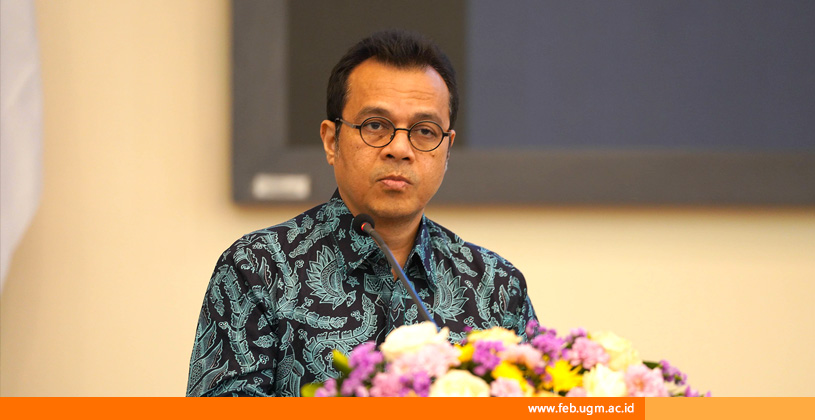Deputy Minister of Communication and Information Technology, Nezar Patria Appreciates FEB UGM's Efforts to Promote Digital Transformation through GM DTGI
- Details
- Written by Najwah
- Category: News
- Hits: 294

The Deputy Minister of Communication and Information Technology (Wamen Kominfo), Nezar Patria, has expressed his appreciation for the efforts of the Faculty of Economics and Business of Universitas Gadjah Mada (FEB UGM) in contributing to the success of the national digital transformation program through the launch of the Gadjah Mada Digital Transformation Governance Index (GM-DTGI) for regional and local governments.
The GM-DTGI was developed by the Center for Information Systems Studies (PKSI) at the Faculty of Accountancy, FEB UGM. This index facilitates assessing digital transformation performance in regional and local governments in Indonesia.
"GM-DTGI is a tangible contribution from UGM to help regional governments measure their digital transformation and support the vision of a Golden Indonesia 2045," he said on Friday (11/10) during the National Seminar on the Release of GM-DTGI for Regional and Local Governments at the Sukadji Ranuwihardjo MM FEB UGM Auditorium.
Nezar emphasized that digital transformation is a strategic step and one of the key pillars in achieving the Golden Indonesia 2045 vision. Digital transformation is an alternative to building a robust digital ecosystem supported by three main pillars: digital economy, digital governance, and digital society.
"This ecosystem will help address digital challenges and needs to be supported by digital infrastructure. With this, it is expected to be a reference in building the digital ecosystem by 2045," Nezar explained.
He also mentioned that digital transformation is more than creating websites or applications. Currently, 27,000 applications have been developed by various government agencies. However, the challenge is to ensure that the developed digital infrastructure can transform work processes and improve the efficiency of public services.
"The key is not quantity but how the existing infrastructure can change how we work, making public services more efficient and better through digital technology. GM-DTGI will show whether the existing infrastructure adequately supports digital transformation in regional governments," he said.
Nezar emphasized the importance of regular assessment through various global indices to ensure the success of digital infrastructure and transformation. These include the IMD, which measures global competitiveness; the Network Readiness Index, which assesses the use of digital technology; and the Digital Economy and Society Index (DESI), which measures digitalization performance in the European Union. These indices contribute to the digital transformation process by improving the effectiveness and implementation of technology in governance.
In line with this, Nezar hopes that the GM-DTI will also expand discussions on digital maturity at the regional level and provide digital insights for both the academic community and the government.
In addition, Nezar pointed out that there are still many challenges in achieving digital transformation in Indonesia. One major challenge is the digitalization gap. Indonesia will need 12,092,110 digital talents by 2023, but there is still a gap of 2,748,260 digital talents or 458,000 talents annually.
Nezar mentioned that to address these challenges, the government has launched the Smart City Program in cooperation with regional governments and various stakeholders. The program covers six key aspects, including smart governance, smart branding, and other digital innovations that aim to accelerate digital transformation at the regional level.
Reportage: Najwah Ariella Puteri
Penulis: Kurnia Ekaptiningrum
Sustainable Development Goals






